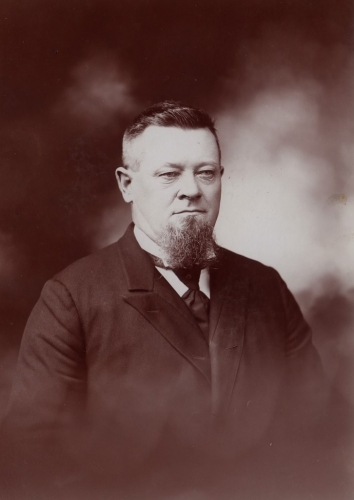Saturday, April 1, 1843 Carl W. Conrad
Carl W. Conrad was born in Guggenheim, Baden, Germany. After receiving a primary education in his native land he found employment with a large champagne manufacturer.
In 1861 at 18 years of age Conrad came to America and settled in St. Louis, Missouri. There he became friends with a brewery supply salesman named Adolphus Busch. Busch had in March of that year married Elizabeth Lilly Anheuser, the daughter of Eberhard Anheuser, the owner of the Bavarian Brewery. Elizabeth was Anheuser's youngest child, and only daughter.
Anheuser brought Busch in to help manage the Bavarian, and in 1879 the firm became the Anheuser-Busch Brewing Association. Meanwhile Carl Conrad was making a name for himself in the wine importing business.
In 1875 or 1876 Conrad, through Busch and the Bavarian Brewery, perfected a light Champagne like beer reminiscent of those they had tasted from the Bohemian city of Budweis. They called it "Budweiser" as an homage to the town that birthed the style. Budweiser turned out to be so popular that Conrad trademarked the brand just two years later. He was granted Trademark #6376.
Trademarking a brand name was a new concept in the beer business. Bass, the world's largest brewer at the time, caused a stir in 1876 by - as legend has it - sending an employee to queue overnight at the registrar's office on New Years Eve in order to score the first trade mark from the UK's Trade Marks Registration Act of 1875.
It was also a savvy business move. By trademarking Budweiser Conrad established a legal foundation for the claim that Budweiser is his "invention" rather than simply a style of beer.
The threat of imitators was very real. This was an era when Colorado breweries were making "Cincinnati Lager" and California breweries were making "Albany Ale". The similarly-styled monikers "Muenchener" (beer in the Munich Style) and "Dortmunder" (beer in the Dortmund style) had become ubiquitous in American brewing.
Also, up until the 1870s naming conventions for beer and ale were almost without exception "Last Name" (apostrophe 's) "Style of beer" If you lived in a part of the country famous for brewing you might add the city name to it "Moerlein's Cincinnati Lager"... "Taylor's Albany Ale" etc. Using an invented name like "Budweiser" just wasn't done. After Budweiser, it was.
The beer was incredibly popular and Carl Conrad expanded into Colorado and other Western states. By 1880 sales of Budweiser were probably outpacing Anheuser-Busch's flagship brand, "St. Louis Lager". Budweiser would soon be known worldwide. The brand owned by Conrad had become very valuable.
The story is that somehow Conrad messed up, that he grew too quickly and his receipts couldn't keep up with his debts, or maybe bottles in these western locations were too scarce... Regardless, in 1883 Conrad renegotiated his agreement with Anheuser-Busch and gave up the rights to Budweiser in exchange for a guaranteed career at the company. It appears also that A-B agreed to keep Conrad's name or monogram on the bottle labels until he died, as the company did, for nearly 40 years.
Carl W. Conrad died suddenly on October 26th of 1922. He was 79 years of age.
Learn more at the links below
Associated Breweries
C. Conrad & Co. (Bottler of Budweiser) of St. Louis, Missouri, USAAnheuser-Busch Inc. of Saint Louis, Missouri, USA
If you see an error, please correct me. Contribute corrections, images and additional information by following the contact link. Contact
Tavern Trove seeks images and facsimiles of signatures of America’s Pioneer Brewers so as to better tell their stories. We offer honest prices for ANYTHING associated with America’s brewing history, from the beautiful to the mundane. Let us know what you have through the contact link above.



